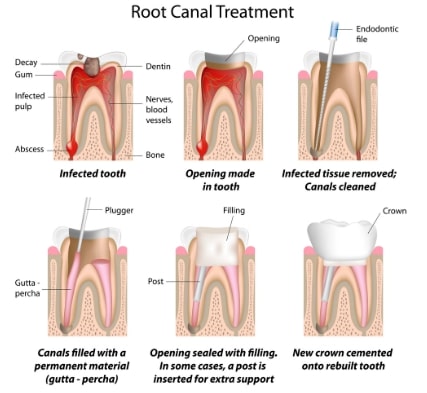Root Canal McLean VA
Don’t worry, the diagnosis is not a curse, but here is some information for you to make it easier to digest.
What’s the cause? Although the most common reason for the diagnosis is dental decay (cavity), there are other reasons a tooth may need the procedure done. For example, If the tooth in question has had trauma either due to an accident or to overwhelmingly strong chewing forces (such as misaligned bite), the nerve of the tooth can become irreversibly inflamed. Another reason is resorption – a process by which tooth structure softens and disintegrates. The etiology of resorption is not yet clear, but root canals are indicated to attempt to stop it from going further. Another cause is a crack in the tooth, depending on the crack, a root canal may or may not be able to save it.
How is it performed? The procedure itself is done under local anesthesia and usually takes anywhere from 1-3 visits depending on difficulty, and the amount of infection in the nerve space. The nerve space is shaped with files that remove both the nerve tissue and debris, the space is then cleaned with medicine, and a seal is placed inside.
Postoperative instructions? Once the procedure is performed, you will be asked to avoid having hard foods in that area to allow the tooth to heal. Some post-operative discomfort is to be expected. Most of the time ibuprofen (Advil) does the trick. Antibiotics may or may not be indicated, depending on the etiology and severity of the infection.
What happens after the procedure? Once the procedure is completed, the tooth will be hollow inside and will need protection from accidental fracture. On back teeth crowns are recommended to maximize longevity. On front teeth many times a traditional filling is all that is needed.
To wrap it up: Maintaining a healthy smile is important. But sometimes, teeth can become severely decayed or infected with bacteria. The damage can extend deep into the tooth structure, effecting the pulp and nerve area. Such extensive damage usually causes unbearable pain while impacting the function of the affected tooth. Left untreated, the infection can spread and affect your overall oral health. Fortunately, a root canal treatment eliminates the infection and restores your smile. Learn more below and contact us today.
What is a Root Canal Treatment?
A root canal treatment saves a severely decayed or infected tooth. In essence, the tooth’s appearance and function are restored to maintain a patient’s oral health. The procedure prevents further damage to the tooth and potential spread to neighboring teeth. Root canal treatments are usually recommended to save a tooth as tooth loss can occur if the infection is left untreated.
What is the Root Canal Procedure?
Before the procedure, the doctor may recommend a dental x-ray to check on the extent of the damage. The procedure first involves the application of anesthetic medications to numb the affected area. The doctor then places a ‘dental dam,’ a protective sheet over the affected tooth to keep it dry from saliva and isolate it from the other teeth.
Next, a small opening created into the affected tooth’s crown. The pulp and root canals are extracted, and the tooth is cleaned and shaped in preparation for the treatment. Once the cleaning and shaping process is complete, the canals are filled with a biocompatible material called gutta-percha.
Finally, the tooth is sealed and a dental crown covers the tooth. Patients usually wait a few weeks to receive their permanent crown. However, My McLean Dentist offers same-day dental crowns with CAD/CAM technology. This state-of-the-art equipment creates your custom-made crown to look and feel natural.
How to Maintain Your Restored Tooth
The treated tooth is durable and can last for a very long time. Be sure to maintain routine dental visits for best results. Issues such as tooth pain and sensitivity should be noted right away. In addition, chipping or a loose fit needs to be corrected as soon as possible. Patients can avoid damage to their restored tooth by avoiding hard foods and maintaining great dental hygiene.
Learn More
My McLean Dentist offers a wide range of dental treatments, including root canals. Pain is a common sign of infection. However, symptoms may not be noticeable. For this reason, we advise maintaining routine dental exams and cleanings to prevent and detect issues early on. Our office is always accepting new patients. Contact us at 703-356-4822 or book an appointment online.

